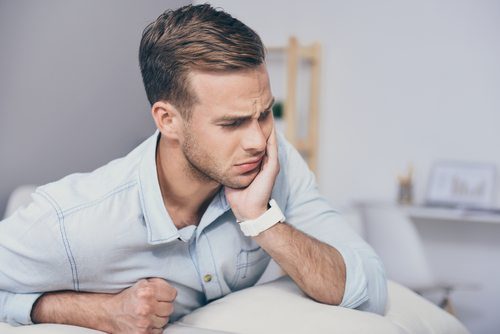Botox Therapeutic may help temporarily alleviate tension and reduce symptoms if you suffer from chronic headaches associated with TMJ disorder. Dr. Engelberg may use Botox® as a part of your treatment plan to help treat TMJ, bruxism, or associated chronic headaches.
Our Arlington Heights dentist office is committed to offering our patients the most modern dental procedures available. Dr. Engelberg has received training from the American Academy of Facial Esthetics to help treat patients with TMJ using Botox injections. Dr. Engelberg has years of experience helping patients with TMJ and now offers Botox for more comprehensive treatment planning.
Botox for therapeutic use can alleviate muscle tension deep in the jaw, neck, and head. It relaxes targeted muscle groups allowing the facial muscles to relax, temporarily reducing TMJ-related headaches and the jaw pain associated with TMJ.
Botox is a non-invasive and non-surgical treatment option for TMJ. There is little to no downtime, and many patients notice muscle tenderness disappearing within 24-48 hours after treatment.

Botox can be used as a part of your treatment plan if you suffer from chronic headaches, TMJ, or bruxism. We also offer bite realignment therapy and bite guards to alleviate TMJ symptoms.
Botox for TMJ: What to Expect
Botox has been a successful component of TMJ treatment plans. For TMJ symptoms caused by the tightening or stress of the jaw muscle, Botox may help to alleviate pain temporarily.
Botox is injected deep into the jaw muscles to alleviate muscle pain associated with TMJ. Treatment only takes 15-20 minutes. The Botox will relax the jaw muscles enough to ease the tension but will not interfere with normal activities such as eating or speaking. Alleviating muscle tension may help allow your jaw muscles to “re-program” and helps prevent teeth grinding or clenching in the future.
After your treatment, you may notice minor redness or swelling at the injection site, which will dissipate within 24-48 hours. Results will gradually appear in the following 7-14 days. Your results can last for up to 6 months.
Botox for TMJ Headaches
Patients with TMJ often experience chronic headaches. Frequent headaches can begin to interfere with your quality of life. Botox Therapeutic may be able to relieve headaches associated with TMJ.
When used for TMJ, Botox can reduce the frequency and intensity of headaches associated with the disorder. As Botox relaxes the temporomandibular joint, headaches may become less frequent or disappear. Botox limits your ability to engage the jaw in grinding or clenching, common causes of headaches.
Dr. Engelberg has trained in the treatment of TMJ-related headaches through the use of Botox injections. With a precise understanding of the intricate jaw muscles and joints, Dr. Engelberg is able to provide most patients with quality and accurate treatment for the relief of TMJ symptoms.
Botox for Enlarged Facial Muscles
Prolonged bruxism, teeth grinding, or clenching of the jaw can lead to enlarged masseter and temporalis muscles. Enlarged masseter and temporalis muscles can make the face appear square or hyper-masculine.
Receiving Botox for TMJ can help to reduce the appearance of the masseter and temporalis muscles. Botox relaxes the muscle making it less visible. With repeated treatments, some patients are able to correct bruxism, and the enlarged muscles may actually decrease in size. Some patients will see a slight change in the shape of their face when treated for TMJ with Botox.
Treatment will take about 20 minutes, and you will be able to return to your normal activities immediately. After your treatment, you may notice minor redness or swelling at the injection site. This will slowly dissipate in the following 24-48 hours, and results will continue to develop over 1-2 weeks time.
